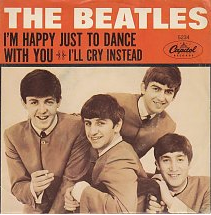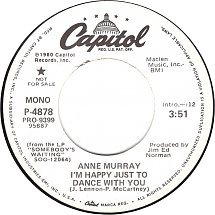| "I'm Happy Just to Dance with You" | ||||
|---|---|---|---|---|
 US picture sleeve (reverse) | ||||
| Single by the Beatles | ||||
| from the album A Hard Day's Night | ||||
| A-side | "I'll Cry Instead" | |||
| Released | 20 July 1964 [1] | |||
| Recorded | 1 March 1964 | |||
| Studio | EMI, London | |||
| Genre | Rock | |||
| Length | 1:58 | |||
| Label | Capitol (US) | |||
| Songwriter(s) | Lennon–McCartney | |||
| Producer(s) | George Martin | |||
| The Beatles USsingles chronology | ||||
| ||||
"I'm Happy Just to Dance with You" is a song written by John Lennon and Paul McCartney [2] and recorded in 1964 by the English rock band the Beatles for the film soundtrack to A Hard Day's Night. Lead vocals are by George Harrison, whose performance in the film marked the first mass media depiction of Harrison singing lead.
